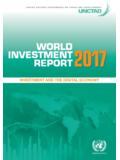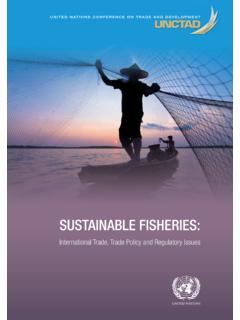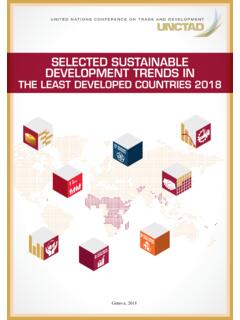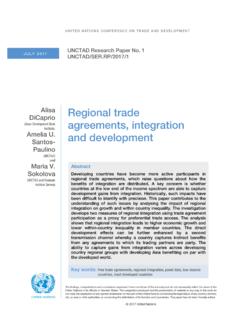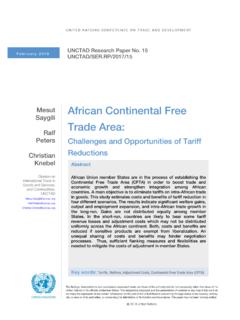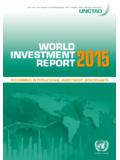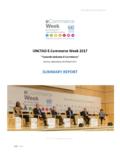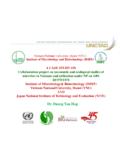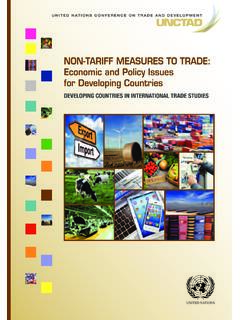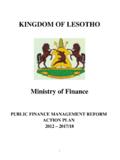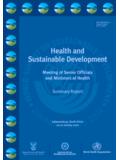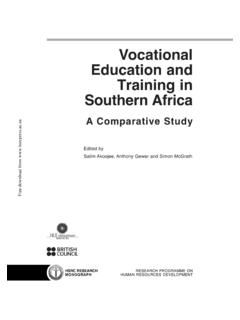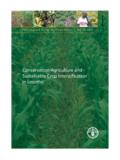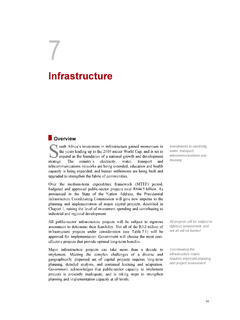Transcription of The Least Developed Countries Report 2017 - …
1 Transformational energy accessUNITED NATIONS CONFERENCE ON TRADE AND DEVELOPMENTTHE Least Developed COUNTRIESREPORT 2017 United Nations publicationSales No 978-92-1-362256-8 ISSN 0257-7550 Printed at United Nations, October 2017 X,XXXUNCTAD/LDC/ 2017 USD 50 ISBN 978-92-1-112914-4 The international community has adopted the goal of achieving universal access to modern energy globally by 2030, as part of the Sustainable development Goals. Together with the potential for renewable energy technologies to provide electricity access to even the remotest communities, this has reinforced the already considerable attention being paid to the , this attention has so far focused mainly on households having access to electricity for their basic needs, and on the environmental benefits of limiting greenhouse gas emissions.
2 Equally important is the economic dimension of modern energy access, which remains relatively 2017 edition of The Least Developed Countries Report highlights the potential contribution that access to modern energy can make to lasting development and sustainable poverty eradication in the Least Developed Countries (LDCs). These Countries require structural transformation of their economies, to increase their productivity and develop new economic activities that generate higher incomes.
3 Access to modern energy, and particularly electricity, is essential to this transformation. Fully harnessing the economic potential of energy calls for a different approach to universal access. It means going beyond basic domestic needs to what the Report calls transformational energy access, to meet the needs of enterprises for adequate, reliable, affordable and sustainable supplies of the energy they require for productive uses. Renewable energy technologies, such as solar and wind power, can play an important role in achieving transformational energy access in LDCs but only if important financial, technical, economic and institutional obstacles can be overcome.
4 A holistic approach is critical. This means both a system-wide approach to the electricity sector itself, and effective integration of energy-access programmes into overall development strategies. Achieving universal access by 2030 and still more transformational energy access will also necessitate a major increase in both funding and the transfer of energy-related Least Developed Countries Report 2017 UNITED NATIONSEMBARGOThe contents of this Report must not be quoted or summarized in the print, broadcast or electronic media before22 November 2017 , 17.
5 00 hours GMTUNITED NATIONS CONFERENCE ON TRADE AND DEVELOPMENTTHE Least Developed COUNTRIESREPORT 2017 Transformational energy accessNew York and Geneva, 2017 NoteSymbols of United Nations documents are composed of capital letters with figures. Mention of such a symbol indicates a reference to a United Nations designations employed and the presentation of the material in this publication do not imply the expression of any opinion whatsoever on the part of the Secretariat of the United Nations concerning the legal status of any country, territory, city or area, or of its authorities, or concerning the delimitation of its frontiers or in this publication may be freely quoted or reprinted, but full acknowledgement is requested.
6 A copy of the publication containing the quotation or reprint should be sent to the UNCTAD secretariat at: Palais des Nations, CH-1211 Geneva 10, overview of this Report can also be found on the Internet, in all six official languages of the United Nations, at Nations PublicationSales No. ISBN 978-92-1-112914-4 eISBN 978-92-1-362256-8 ISSN 0257-7550 UNCTAD/LDC/ 2017 Copyright United Nations, 2017 All rights reservedForewordUnlike the Millennium development Goals, the 2030 Agenda for Sustainable development includes an explicit goal for energy Sustainable development Goal (SDG) 7, to ensure access to affordable, reliable, sustainable and modern energy for all.
7 Access to modern energy plays a major role in economic structural transformation a critical issue both for the Least Developed Countries (LDCs) and for the 2030 Agenda more generally. This year s edition of UNCTAD s Least Developed Countries Report focuses on transformational energy access for the LDCs, where 62 per cent of people have no access to electricity, compared with 10 per cent across other developing Countries . Today, the majority of people worldwide who lack access to electricity live in LDCs a proportion that has grown steadily from less than one third in , this year s Report finds that energy for all in LDCs requires more than access to energy for basic household needs.
8 It requires that access to energy in LDCs also serves productive capacities directly, by powering the structural transformation of LDC economies and the development of more productive, modern activities and sectors with adequate and reliable energy supplies. Structural transformation, in turn, has a role in increasing energy access, by generating sufficient additional demand for electricity for productive uses to make viable the infrastructure investments required for universal access more broadly. Yet strengthening this energy-transformation nexus remains a massive challenge, given that installed generating capacity per person in LDCs is barely one twelfth of that even in other developing Countries , and one fiftieth of that in Developed Countries .
9 The LDCs are the battleground on which the 2030 Agenda will be won or lost. The central role of access to modern energy in achieving the other SDGs means that meeting SDG 7 will be central to the success or failure of the 2030 Agenda as a whole. It is our intention that this Report will serve as a valuable input to the deliberations of the 2018 High-level Political Forum, which will review progress on Goal 7. Greater international support and more concerted collective action towards realizing transformational energy access in the Least Developed Countries could be key catalysts for implementing the entire 2030 KituyiSecretary-General of UNCTADThe Least Developed Countries Report 2017ivAcknowledgementsThe Least Developed Countries Report 2017 was prepared by UNCTAD.
10 Contributors to this Report are: Rolf Traeger (team leader), Samar Awadh, Josu Banga, Bineswaree Bolaky, Agn s Collardeau-Angleys, Pierre Encontre, Sixun Li, Madasamyraja Rajalingam, Matfobhi Riba, Alessandro Sanches Pereira, Giovanni Valensisi, Stefanie West and David Woodward (the LDC Report team). The work was carried out under the overall guidance and supervision of Paul Akiwumi, Director, Division for Africa, Least Developed Countries and Special Programmes. A meeting was held in Geneva on 13 14 June 2017 to peer-review the Report and its specific inputs.
